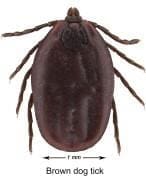A DOG in Horsham has tested positive for ehrlichiosis – the first detection of the disease for an Australian-born dog in Victoria.
 The dog came from the Northern Territory where the disease is established.
The dog came from the Northern Territory where the disease is established.
Victoria’s Chief Veterinary Officer Dr Graeme Cooke urged all Victorian dog owners and veterinarians to be on the lookout for the new dog disease that is spread by brown dog ticks.
Dr Cooke said common signs of ehrlichiosis could include fever, lethargy, eye changes such as conjunctivitis, cloudy or red eyes; abnormal bleeding and swellings, small spots or bruising; and swellings on the body and limbs.
“When detected early, antibiotics may be used to treat the disease,” Dr Cooke said.
“Prevention is crucial as there is no vaccine for the disease. Protect your dogs from ehrlichiosis by regularly checking them for ticks, using effective tick control and seeking veterinary advice promptly if they become unwell.
“You should regularly check your dog for ticks by running your fingers through their coat, on the skin, paying attention to the head, neck, ears, chest, between their toes and around their mouth and gums.
“Be particularly vigilant if you’re taking your dog out bush and travelling interstate.”

Photo © Pia Scanlon, WA Agricultural Authority, DPIRD
Ehrlichia canis, the causative agent of canine ehrlichiosis, was detected in a small number of domesticated dogs in the Halls Creek, Northern Territory, and Kununurra, Western Australia area in May 2020.
This was the first detection of Ehrlichia canis (E. canis) in Australia. Further detections have occurred in the Pilbara region of Western Australia.
E. canis was later confirmed in domesticated dogs in Katherine and Alice Springs in the Northern Territory and ticks carrying E. canis were recently detected in the north of South Australia.
E. canis has not been detected in dogs that have lived in NSW for their entire lives. Four dogs that were brought into NSW from the Northern Territory have tested positive for E. canis and are under veterinary supervision by private veterinarians.
To date, no dogs of Queensland origin have tested positive for E. canis.
Tasmania has recently reviewed dog import requirements and will soon introduce a requirement for dogs to be declared tick free when arriving into the state.
“This is a notifiable disease in Victoria, which means it must be reported to the Emergency Animal Disease Watch Hotline on 1800 675 888 when suspected,” Dr Cooke said.
“If your dog is unwell or you find any abnormal bumps or ticks, make sure you promptly arrange to take your dog to your vet. Discuss with your vet the testing system in place for ehrlichiosis in Victoria.
“Put a tick in a clean resealable bag and take it to your local veterinarian to submit for identification. Freeze the bag with the tick first if you cannot take it to a vet immediately. If you are unsure about what is an appropriate tick control product to use, then consult your Veterinary advisor.”
On rare occasions humans can become infected through the bite of an infected tick.
Please seek medical advice if you feel unwell after being exposed to ticks. For more information on ehrlichiosis (or e-canis), visit the Agriculture Victoria website or call the Customer Contact Centre on 136 186.
More information from a national perspective can be found on the DAWE website here.
Sources: Agriculture Victoria, Federal Department of Water, Agriculture and the Environment
